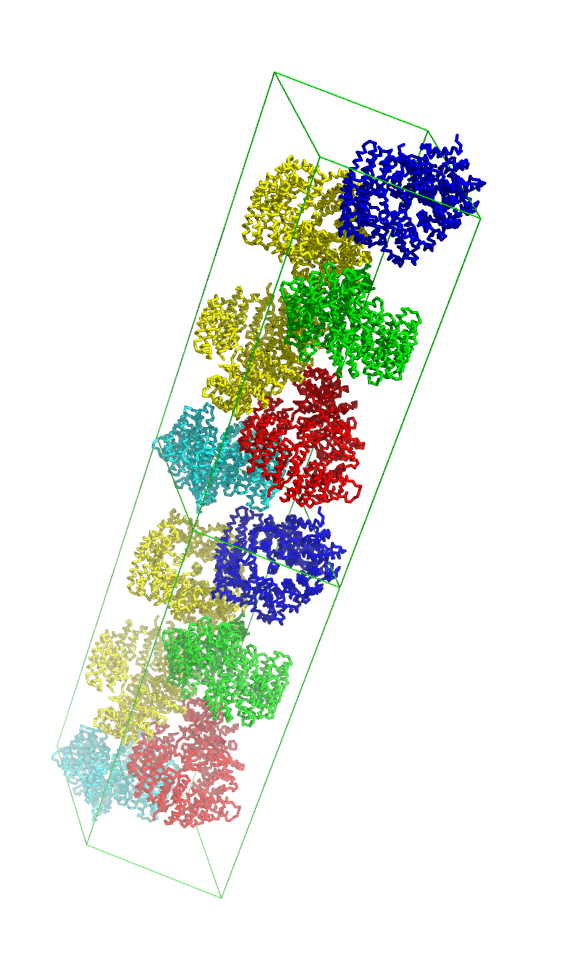This is a read-only mirror of pymolwiki.org
Difference between revisions of "Supercell"
Jump to navigation
Jump to search
(created) |
m (1 revision) |
||
| (11 intermediate revisions by 3 users not shown) | |||
| Line 1: | Line 1: | ||
| − | = | + | {{Infobox psico |
| + | |module = psico.xtal | ||
| + | }} | ||
| − | + | [[File:SupercellExample.png|200px|thumb|right|Example with 2 unit cells in c-direction, created with: supercell 1,1,2,2x19]] | |
| − | = Example = | + | '''supercell''' can display multiple copies of the unit cell. |
| + | Can also fill the unit cell (and its copies) with symmetry mates. | ||
| + | |||
| + | See [http://sourceforge.net/mailarchive/forum.php?thread_name=l2vdcf611bd1004140816zeca28714mf76b9f72008099ab%40mail.gmail.com&forum_name=pymol-users thread on pymol-users mailing list]. | ||
| + | |||
| + | Requires [http://numpy.scipy.org numpy]. | ||
| + | |||
| + | == Example == | ||
<source lang="python"> | <source lang="python"> | ||
| − | run | + | # import psico.xtal, or run the standalone script: |
| + | run https://raw.githubusercontent.com/speleo3/pymol-psico/master/psico/xtal.py | ||
| + | |||
fetch 2x19, async=0 | fetch 2x19, async=0 | ||
supercell 2,1,1, 2x19, green | supercell 2,1,1, 2x19, green | ||
| Line 12: | Line 23: | ||
</source> | </source> | ||
| − | = | + | == See Also == |
| − | |||
| − | |||
| − | |||
| − | |||
| − | |||
| − | |||
| − | |||
| − | |||
| − | |||
| − | |||
| − | |||
| − | |||
| − | |||
| − | |||
| − | |||
| − | |||
| − | |||
| − | |||
| − | |||
| − | |||
| − | |||
| − | |||
| − | |||
| − | |||
| − | |||
| − | |||
| − | |||
| − | |||
| − | |||
| − | |||
| − | |||
| − | |||
| − | |||
| − | |||
| − | |||
| − | |||
| − | |||
| − | |||
| − | |||
| − | |||
| − | |||
| − | |||
| − | |||
| − | |||
| − | |||
| − | |||
| − | + | * [[SuperSym]] | |
| + | * [[symexp]] | ||
| − | + | [[Category:Script_Library]] | |
| − | + | [[Category:Math_Scripts]] | |
| − | |||
| − | |||
| − | |||
| − | |||
| − | |||
| − | |||
| − | |||
| − | |||
| − | |||
| − | |||
| − | |||
| − | |||
| − | |||
| − | |||
| − | |||
| − | |||
| − | |||
| − | |||
| − | |||
| − | |||
| − | |||
| − | |||
| − | |||
| − | |||
| − | |||
| − | |||
| − | |||
| − | |||
| − | |||
| − | |||
| − | |||
| − | |||
| − | |||
| − | |||
| − | |||
| − | |||
| − | |||
| − | |||
| − | |||
| − | |||
| − | |||
| − | |||
| − | |||
| − | |||
| − | |||
| − | |||
| − | |||
| − | |||
| − | |||
| − | |||
| − | |||
Latest revision as of 16:19, 20 July 2020
|
Included in psico | |
| Module | psico.xtal |
|---|---|
supercell can display multiple copies of the unit cell. Can also fill the unit cell (and its copies) with symmetry mates.
See thread on pymol-users mailing list.
Requires numpy.
Example
# import psico.xtal, or run the standalone script:
run https://raw.githubusercontent.com/speleo3/pymol-psico/master/psico/xtal.py
fetch 2x19, async=0
supercell 2,1,1, 2x19, green
supercell 1,1,2, 2x19, orange, name=super2
